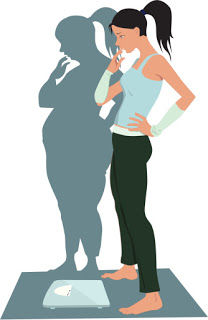A new study in the International Journal of Eating Disordersmakes a connection between emotion regulation and specific symptoms of anorexia nervosa. Here, we ask Jennifer Wildes, Ph.D., Assistant Professor of Psychiatry and Psychology at the University of Pittsburgh School of Medicine and senior author of the paper, to explain the connection between emotions and eating disorders, and what the findings mean.
Q: How are emotions and eating disorders like anorexia nervosa (AN) connected?
A: Eating disorders occur when food and weight become a central focus of one’s life, leading to unhealthy behaviors like extreme dietary restraint, binge eating, and purging (i.e., self-induced vomiting or the misuse or laxatives or water pills). A focus on food and weight is especially challenging in a culture where there is an excess of food and a focus on thinness.
Eating disorders are psychiatric conditions that are closely tied to emotions, and include anorexia nervosa, bulimia nervosa, and binge eating disorder. The cause of eating disorders is unknown. Genetic factors, family issues, psychological factors, or traumatic events all may play a role. In anorexia nervosa (AN), individuals have an intense fear of gaining weight and an inability to maintain a normal body weight. AN often is associated with perfectionism, social anxiety, emotional inhibition, reluctance to take risks, and conflict avoidance.
In bulimia nervosa, individuals attempt to restrict dietary intake, and engage in binge eating and purging episodes. Individuals who binge eat or purge, as a part of AN or bulimia nervosa, are more likely to engage in secretive behavior, experience unstable moods and thought patterns, and be hypersensitive to criticism.
A common pattern in all eating disorders is an inability to regulate emotions, which was the focus of our study.
Q: Previous research has shown that those with anorexia nervosa (AN) struggle with emotion regulation. What is different about your new study?
A: Yes, there is a lot of research connecting problems with emotion regulation to anorexia nervosa (AN). Those with AN often have difficulty recognizing and understanding emotional experiences both in themselves and in other people, pay less attention to and are less aware of emotions in general, and struggle to cope with negative emotions. Individuals with AN also may have problems with behavior control; for example, binge eating is an impulsive behavior. Some experts think that eating disorder behaviors actually develop as a method of emotion regulation in individuals who have pre-existing problems controlling their emotions.
Our study provides new information about the relation between specific aspects of emotion regulation and particular AN symptoms such as low body weight and purging episodes. We used previous research and an emotion regulation assessment tool to understand the function of specific eating disorder symptoms among nearly 200 patients with AN.
Q: What did your study find?
A: Recurrent binge eating and recurrent purging were associated with impulse control difficulties when upset, whereas frequent thoughts about eating, weight and shape (i.e., eating disorder cognitions) were associated with numerous emotion regulation difficulties. When we looked at multiple predictors of these symptoms at the same time, impulse control difficulties when upset continued to be associated with binge eating and purging, while poor emotional awareness was related to eating disorder cognitions. There was no significant relationship between emotion regulation and low body weight.
Q: What does this mean for treatment?
A: The more we understand about emotion regulation and eating disorders, the better able we will be to promote recovery from AN. Specifically, this work could help to advance treatments designed to reduce AN symptoms through enhancement of emotion regulation skills.
You can learn more about eating disorders treatment options, too, by checking out the Center for Overcoming Problem Eating (COPE) here in Pittsburgh.
You can learn more about eating disorders treatment options, too, by checking out the Center for Overcoming Problem Eating (COPE) here in Pittsburgh.









